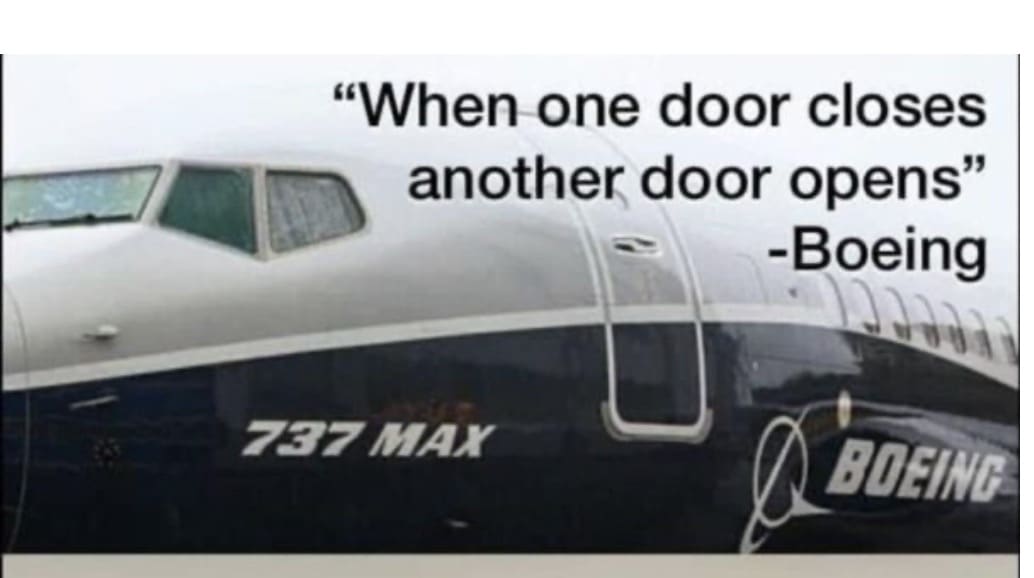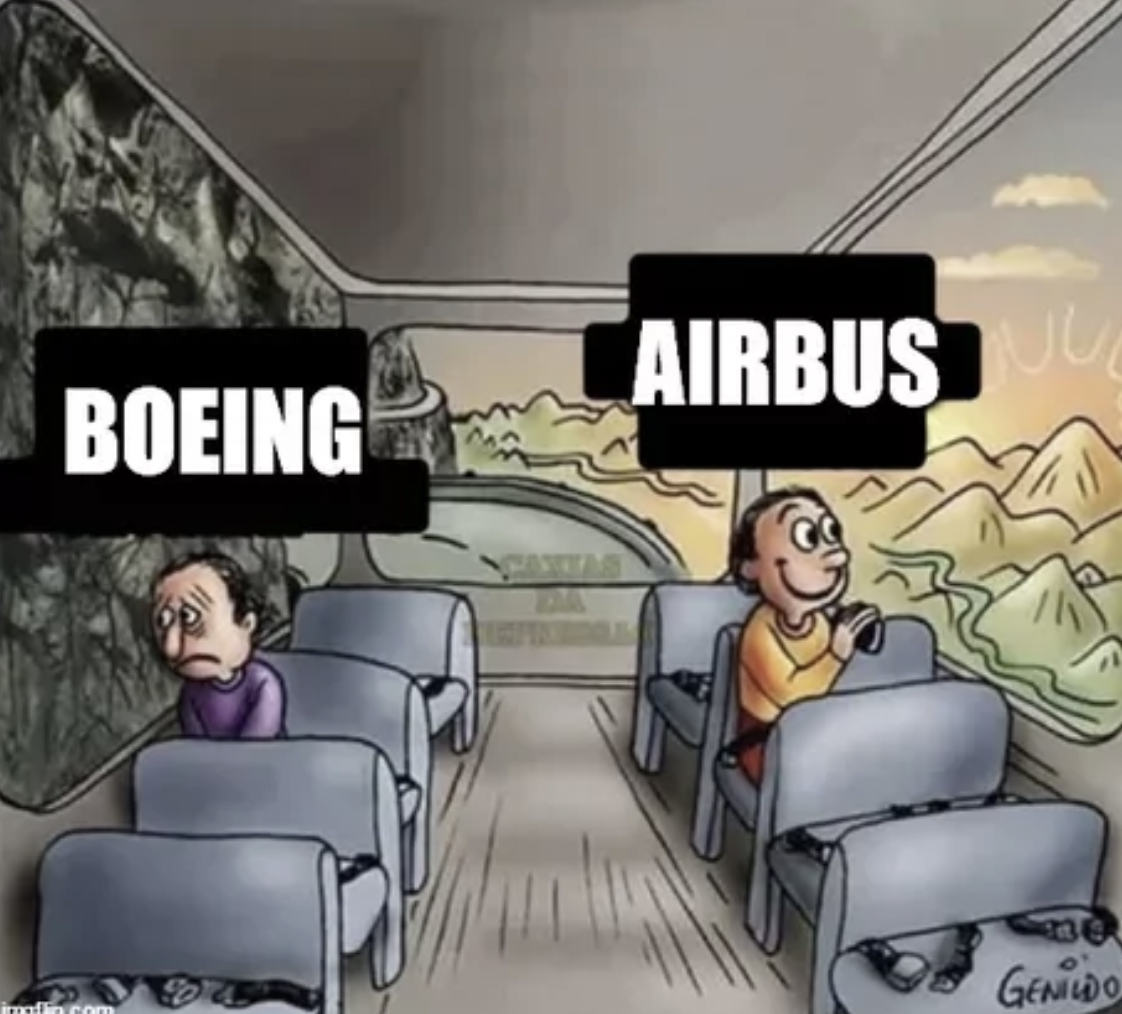How Boeing Defrauded The US And Got Away With A ‘Mere Slap On The Wrist’ And Perhaps Murders Too As Curious Cases Of Whistleblowers Dying Add Jitters

It was a ‘Boeing blowout’ that made the world shake, literally.
On January 5, the world witnessed a dramatic mid-air incident involving Alaska Airlines Flight 1282.
Shortly after takeoff from Portland, Oregon, en route to Ontario, California, a two-by-four-foot panel blew out at 30,000 feet, creating a gaping hole in the side of the Boeing 737-9 Max.
“There was the loudest explosion,” recalled passenger Joan Marin. “The wind, the noise, the roar”, even as terrified passengers scrambled for falling oxygen masks.
The intense vacuum ripped the V-neck sweater and T-shirt from a 15-year-old seated by the window, sending his headset and cell phone flying into the sky.
Needless to say, for Boeing, the plane’s manufacturer, this incident was a devastating blow.
The 108-year-old aerospace giant had been struggling with safety concerns since the two fatal crashes half a decade ago tarnished its reputation and strained its finances—the Lion Air and Ethiopian Airlines disasters that together claimed 346 lives.
Those tragedies led to the dismissal of then-CEO Dennis Muilenburg, with David Calhoun, a 26-year GE veteran, stepping in as CEO in January 2020.
Following this latest incident, Calhoun stated, “We’re going to approach this, number one, by acknowledging our mistake. We’re going to approach it with 100% and complete transparency every step of the way.”
The fallout from this disaster also led to the ousting of the 737 program’s production chief on February 21.

Being Guilty Yet It Has No Real Meaning
Boeing now faces up to $487 million in fines as part of its anticipated guilty plea to a felony charge related to the two fatal 737 Max crashes. Critics, however, argue that the deal is merely a “slap on the wrist.”
Now, corporate guilty pleas from companies the size of Boeing are rare, and some plea agreement terms are undoubtedly challenging for Boeing leadership; yet, the deal underlines the limitations of corporate criminal charges.
Boeing agreed to plead guilty to defrauding the Federal Aviation Administration by concealing crucial information about a design flaw in the 737 Max during its original certification.
Mind you, this flaw was linked to the crashes in 2018 and 2019 that killed 346 people and plunged the company into a crisis, resulting in $32 billion in losses.
However, many contend that it doesn’t smell like a tough deal.
As part of the plea settlement reached late Sunday, a $243 million fine that Boeing agreed to pay in 2021 could be doubled to $487 million.
“That’s what, the price of three 777’s?” Goeltz remarked. “I’m not sure that it’s a significant fine.”
Some telling figures support Goeltz’s view.
Before its financial troubles began in 2019, Boeing was reporting record annual revenue of $101 billion and a record core operating profit of $10.7 billion, making the $487 million fine seem relatively minor in comparison.

Not Good Enough
While Boeing’s credit rating is now at risk of falling into junk bond status for the first time, credit rating agency Moody’s stated on Monday that the plea and penalties “will have little effect on Boeing’s finances or operations.”
Boeing nearly escaped even this minimal consequence; in January, a door plug blew off a 737 Max at 16,000 feet and while no one was killed or seriously injured on that Alaska Airlines flight, the incident brought unwanted attention and federal investigations, disrupting an agreement Boeing had reached in January 2021 with the Justice Department to avoid prosecution for defrauding the FAA during the Max certification.
This incident occurred just days before the probationary period would have ended.
The anticipated guilty plea did little to satisfy family members of the crash victims, who labelled it a “sweetheart deal,” an “atrocious abomination,” and a gross “miscarriage of justice.”
Their attorneys argued that Boeing should have faced a maximum fine of up to $24.8 billion, based on a multiple of their estimate of combined losses sustained by the families.
In Comparison
Ironically, other corporations that pleaded guilty to felonies have agreed to much larger fines.
For instance, oil giant BP agreed to pay $4 billion to settle criminal charges, including manslaughter, related to the explosion and oil spill at its Deepwater Horizon platform in 2010 that killed 11 workers.
Likewise, Volkswagen pleaded guilty to three US felony charges and agreed to pay $2.8 billion in criminal penalties in 2017 after admitting to cheating on diesel emissions tests.
“The fact that this is in the millions of dollars rather than billions is an indication this is a slap on the wrist,” said Paul Cassell, a University of Utah law professor who worked on the BP case on behalf of victims and is now working for the families in the Boeing crashes.
One of the facts angering family members is that Boeing agreed to plead guilty to defrauding the FAA rather than facing manslaughter charges for the deaths of hundreds of people.
“That’s a tougher case to prove, but I believe the evidence was there,” said Mark Lindquist, an attorney representing family members and some passengers aboard the Alaska Air flight.
“As a practical matter, the result might not have been a lot different if there had been manslaughter rather than fraud charges in this criminal case,” Lindquist said. “From a philosophical basis, it would have felt more like accountability and justice for the victims’ families.”

Boeing Executives Walk Scot Free
While the Justice Department announced in January 2021 that “misleading statements, half-truths, and omissions communicated by Boeing employees to the FAA” played a direct role in the crashes, it has taken only limited criminal action against individual employees, and none against the top executives who oversaw the company’s decisions at that time.
The Justice Department stated early Monday that the agreement included “no immunity to any individual employees, including corporate executives, for any conduct.”
However, of the two former Boeing employees cited in the original settlement of the case in 2021, only one, Mark Forkner, the chief technical pilot at Boeing at the time, ever faced criminal charges. He was eventually acquitted after his attorney convinced the jury that he was being made a scapegoat.
“As a practical matter, individuals are more sympathetic to jurors than companies,” Lindquist said. “DOJ made a prosecutorial decision to pursue the company rather than individuals.”
There are also defenses in an individual’s criminal case that are not possible in a corporate criminal case. “With an individual, there’s always someone else he or she can point the finger at,” Lindquist explained.
Lindquist noted that Boeing’s attorneys aimed to ensure that its executives did not face any criminal charges. “From the beginning, that’s been clear,” he said.
A Boeing spokesman stated the company had no comment about the anticipated guilty plea or the case beyond a brief statement confirming the agreement.
Is There A Way To Make Boeing Executives Pay?
Yes, even if criminal charges are not brought against executives, they can still face significant penalties, said Arlen. One such measure is “clawbacks,” where Boeing could demand executives return bonuses they received during the period when misconduct occurred.
“Ensuring that individuals are held accountable is the most important thing,” she emphasized.
However, the Boeing board has shown little inclination to hold executives financially responsible.
Recently, CEO Dave Calhoun received a 45% raise, increasing his pay from $22.6 million to $32.8 million for 2023. His predecessor, Dennis Muilenburg, lost his CEO position at the end of 2019 without severance but left with a stock package worth about $80 million at that time.
When asked about potential clawbacks, Boeing pointed to company policy, which states:
“The board shall have the discretion… to recover incentive-based compensation paid to any executive of the company who has engaged in fraud, bribery, or illegal acts… or knowingly failed to report such acts of an employee over whom such officer had direct supervisory responsibility.”
Despite this policy, no clawbacks have occurred.
Arlen also suggested that compensation for board members should be subject to clawbacks. Although Calhoun was not an executive during the certification process for the Max, he was on the Boeing board, receiving more than $300,000 a year.
“At the end of the day, when you have a company with systemic problems, the ultimate buck stops with the board,” she asserted.
Boeing Likely To Keep Government Contracts
The most serious penalty Boeing could face is being barred from federal government contracts due to its guilty plea, which could potentially drive the company out of business.
In 2023, US government contracts accounted for 37% of Boeing’s revenue, or about $29 billion, according to company filings.
While Boeing will need waivers from the government to continue its contracts, these waivers are expected to be granted. Most contracts are with Boeing’s defense and space business, not its commercial aircraft unit.
Pentagon spokesperson Air Force Major General Patrick Ryder stated that the Department of Defense will “assess the company’s remediation plans and agreement with the Department of Justice to determine the necessary and appropriate steps to protect the federal government.”
The US government has few alternatives to Boeing despite the expected guilty plea and years of quality issues. Few, if any, federal decision-makers want to see Boeing go out of business. Boeing remains the nation’s largest exporter, employing nearly 150,000 US workers.
Boeing estimates its economic impact at $79 billion, supporting 1.6 million direct and indirect jobs at more than 9,900 suppliers across all 50 states. It is also crucial to the smooth operation of the nation’s air travel system.
“It’s very clear to me Boeing is going to survive this,” said Robert Clifford, another lawyer for family members of crash victims. “Why is Boeing getting a pass that other criminal defendants do not? Because they’re Boeing.”

The Curious Cases of Whistleblowers Dying
Social media abuzz with opinions, raised-eyebrow emojis, and WTF reactions following the unexpected death of a second person who had publicly criticized the safety of Boeing airliners.
Cyber satirists are now asking: what is more dangerous, being a Boeing whistleblower or flying on the 737 Max?
Joshua Dean, 45, a former employee of Spirit AeroSystems, a key subcontractor in the production of 737 Max airliners, died suddenly after falling ill.
His death came less than two months after John Barnett, a former 787 Boeing production-quality manager turned whistleblower, was found dead in his truck with a gunshot wound. While Barnett’s death is suspected to be a suicide, no official cause has been determined.
One is not alone if the news led one to suspect foul play.
Dean and Barnett were among many who challenged Boeing’s claim that the company prioritizes safety.
The speculation and concern surrounding their deaths, both online and within circles closer to Boeing, are noteworthy; if other safety whistleblowers and their lawyers become frightened and stop speaking out as passengers, one should be worried, too.
Two decades ago, Taylor Smith, 63, was one of three Boeing workers who sued the company, alleging that a key supplier was using defective parts to build the 737 Max’s predecessor, the 737 Next Generation.
This occurred at the same Wichita, Kansas factory where Joshua Dean would later make similar allegations about substandard parts being used in the Max.
William Skepnek, who represented Smith, along with co-workers Jeannine Prewitt and James Ailes, is not surprised that his former clients might link Dean and Barnett’s deaths to whistleblowing activities.
“I cannot help but believe that everybody who is with Boeing or has ever been with Boeing and knows things has reached that conclusion,” said Skepnek, who spent more than a decade on the case involving shoddy parts, which was dismissed in 2014.
What struck Skepnek about Dean’s death was the sudden onset of illness in an otherwise healthy and relatively young man; during their ordeal at Boeing, Smith and Prewitt also complained of mysterious ailments, including, they claimed, exposure to toxic mold.
Prewitt has previously stated that the company supplying the faulty parts was audited by a Boeing team, and the president of that company allegedly threatened violence against the auditors.
“That’s a huge red flag that a supplier feels so confident that he could tell a team of 14 people from Boeing that they were going to be shot,” she told documentarian Tim Tate in 2010.
This, she said, speaks volumes about Boeing’s culture and is definitely something to make note of.
Next time flying a Boeing aircraft, it is advisable to carry parachutes!




